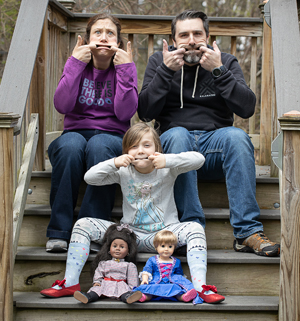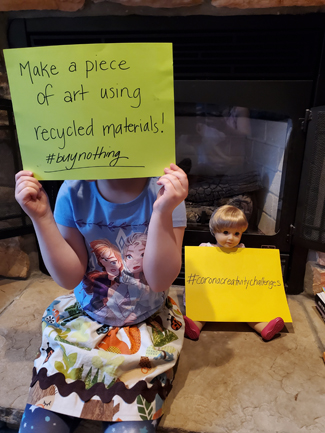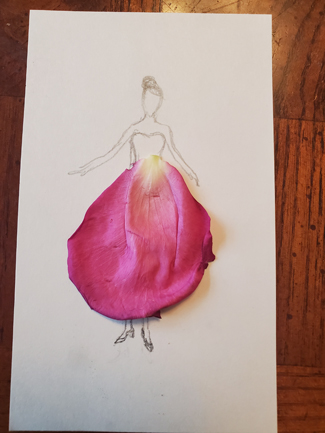March 25, 2021
 This is the seventh in a series of guest blogs by the 2020-21 Michigan Regional Teachers of the Year. Liz Honeysett is an art and technology teacher at Portage Central High School, Portage Public Schools.
This is the seventh in a series of guest blogs by the 2020-21 Michigan Regional Teachers of the Year. Liz Honeysett is an art and technology teacher at Portage Central High School, Portage Public Schools.
Dr. Viktor Frankl wrote his inspiring book “Man's Search for Meaning” after enduring the horror of the Holocaust. In it, he coined the term “tragic optimism,” the fundamentals of which boil down to taking tragic events, along with the guilt and the pain of it all, and transforming them into an opportunity to better oneself and the world. Seeing the good in the bad. Recognizing the tragedy and the pain of it all, yet believing that good can come from it.
We have seen this time and time again: in the wake of 9/11, after Hurricane Katrina, the tsunami in Japan and so many other disasters around the world, both natural and human-made. The opportunity presents itself yet again during our current situation: the COVID-19 pandemic.
Now more than ever, we need to find ways each and every day for tragic optimism to shine through in our words and our actions. Over the course of this year, there are a few things, big and small, that I have experienced that have helped to sustain my soul. I have also seen things that have shaken my foundation and stirred within me a desire for change. I want to share them with you in the hopes that they will inspire you to see your own moments of tragic optimism.
Gratitude

One of the mindfulness activities I engage in is guided meditation, and one of my favorites is about gratitude. In it, you are asked to think about the things you are most grateful for, and it starts with the usual things, like health and family. Then it moves on and asks you to be grateful for the challenges you have faced and how they have helped you grow.
This shift in focus can be a difficult one. I mean, who wants to express thanks for tragedy, especially one like the pandemic, where sickness, suffering and death, along with glaring societal inequities, are at the forefront? Yet those are the exact things for which we should be thankful. When a new perspective emerges, even one brought on by tragedy, it is an opportunity for us to right the wrongs.
Nothing could have prepared us for this pandemic. And nothing could have prepared our students. Isolated from the social development that a school and its network of peers brings, our students have faced some serious obstacles over the course of this year. I have seen many of my students grapple with loneliness, anxiety, depression and lack of motivation.
And in the moment, it is difficult to be grateful for these things. But looking ahead, months, even years, it is my hope, my belief, that these same children will be able to say, with confidence, that because they have faced this adversity, they can do anything. Like the force of time and pressure put on a rock to create a diamond, the pandemic will help us to emerge stronger and more brilliant than ever before. Take the time for yourself to look inward and find those moments of gratitude, for things big and small, easy and hard, and take that gratitude with you wherever you go.
Creativity


Creative thinking and creative problem-solving are essential to the development and betterment of our world. The creativity seen throughout this event has been staggering. Performing arts organizations and individuals have devised ways to bring the arts into our homes to help heal and entertain. Engineers have worked tirelessly to develop ventilators and other medical devices to help treat COVID patients. Scientists from all walks of life have worked to develop a vaccine in record time. Teachers have embodied creativity, learning to teach, coach, inspire and lead virtually, in person and sometimes a combination of the two.
During the first 30 days of the pandemic last March, I worked with a colleague to design and implement daily #coronacreativitychallenges so that our students could stay active and engaged. Ranging from cooking to visual and performing arts to makeup and photography, students continued to grow and flex their creative muscles.
I learned a few new things myself. That experience, and others like it, helped so many of us, even in the darkest of times, and I'm surely not the only one for whom creativity was a saving grace. Without the pandemic forcing our hand, who knows what creative experiences and solutions would never have emerged?
What creative solutions to problems have you experienced or even come up with during this past year? How can you take those solutions with you into the future, our new normal?
Teaching and Learning
One of the many challenges we have faced as educators has been how to get our students working remotely to be and stay engaged. The temptations of video games and social media, as well as the desire for many students to “do school” underneath their covers, are all too real. I see it every day, and I know I am not alone in my school and in the teaching community at large.
We are quick to blame children, but it is not their fault. We are forced to maintain an established system where students rely on teachers for most, if not all, aspects of learning. We have done little to prepare our students to be independent learners, driven by their own curiosities and interests, as the systems that be require us to focus instead on testing, preparation for testing and grades.
The lesson we can learn from this is the need for systemic change in the way we approach teaching and learning. This shift requires radical thinking, which is what tragic optimism is all about. It requires looking at traditional teaching methodologies from a critical lens. It requires us to examine ways we can put learning in the hands of our students by incorporating things they are interested in.
Recently, I was privileged enough to attend to talk by author Jason Reynolds. He talked about never reading a book cover to cover until he was a senior in high school. It wasn't until a teacher encouraged him to read something that he could identify with that he was able to have his passion for reading, and subsequently writing, ignited. This talk reignited something in me, and helps me shift my focus to encourage my students to be more independent learners, to give over control, to push and let go, while still being there on the peripheral to redirect when necessary.
It is my hope that we, those of us in education and those of us outside of it, will be able to one day see this pandemic for what it really is: a tragic event as an impetus for dynamic change. May it encourage us to continue to think and act creatively. May it continue to invoke feelings and acts of gratitude, not just for the gifts we are given, but for the challenges that have helped us to grow. And may it lead to real systemic change in the current systems of education so that all children can see and experience school as a place where they can be curious, independent, passionate learners.
Is the COVID-19 pandemic a tragedy? It most certainly is. Do we have what it takes to emerge from the ashes better and stronger than ever? We most certainly do.
My name is Liz Honeysett and I am an art and technology teacher at Portage Central High School. I am the 2020-21 Region 7 Teacher of the Year and am in my 16th year of teaching. In addition to teaching, I am the production manager for our school’s theater program and an adviser for Link Crew. Originally from Wisconsin, I was fortunate enough to attend public arts magnet schools from elementary through high school, which solidified my lifelong passion for the arts in education. Outside of school, I enjoy running and strength training, theater, cooking and spending time with my husband and 6-year-old daughter.